#chinese folk instrument
Text
By 陈依妙chen yimiao
602 notes
·
View notes
Text
Sai Ma (Horse Racing)
youtube
#song tag: sai ma#song tag: horse racing#chinese music#chinese folk music#culture tag: china#folk song#folk music#have you heard this folk song#language tag: instrumental#Youtube
6 notes
·
View notes
Video
youtube
玉葵寶扇之<大鬧梅知府>, <碧蓉探監> (Jade Palm-Leaf Fan)
杜煥 (Dou Wun)
Hong Kong/Guangdong, China (1975)
Deishui Naamyam/Cantonese Folk/Chinese Folk
Tracklist:
1. 大鬧梅知府 Uproar At Governor Mui's Office (0:00)
2. 碧蓉探監 Visiting the Prison (38:24)
It's our blind master Dou Wun again! These priceless pieces were also recorded live at Fu Loong Tea House in 1975 just like the first one we posted. Jade Palm-Leaf Fan is one of the most well-known repertoires in Cantonese folk music and the tracks included in this album are the most popular songs in the repertoires. Both Cantonese operas and naamyam (in a narrower sense) have their versions of these two tracks but it's extremely difficult to find recordings in Dragonboat style. It's rare.
Crate
youtube
絕世遺音:板眼、龍舟、粵謳 (Rare Recordings of Melodies from a Bygone Age)
杜煥 (Dou Wun)/李銀嬌 (Lee Ngan Giu)
Hong Kong/ Guangdong, China (release: 2011)
Deishui Naamyam/Cantonese Folk/Chinese Folk/Field Recordings
Tracklist:
1. 兩老契嗌交/爛大鼓 Quarrels of the Cousins (0:00)
2. 武松祭靈 Wu Song (20:53)
3. 桃花扇 The Peach Blossom Fan (44:50)
It's our beloved Dou Wun here again, introducing three more genres of Cantonese music (which can also be called Namyaam in a wider sense) , namely 板眼 Banngaan, 龍舟 Dragonboat [Lungjau] and 粵謳 Yuet Au. Banngaan is vulgar comedies sung for popular entertainment, Dragonboat is a genre derived from promotional busking performance of Cantonese shops in the old times, while Yuet Au is ballads sung by prostitutes or blind women.
Crate
Dou Wun (杜焕; 1910–1979) was a blind virtuoso musician specializing in the Cantonese folk music and storytelling tradition of naamyam (南音, literally Southern sound or tone). Born in Zhaoqing, Guangdong he became nearly completely blind as a child, introduced to the sizeable community of fellow blind musicians and after following a few masters was taught naamyam. This network would eventually lead him to Hong Kong through Macau, where he continued to perform and lead a rather tragic personal life. While he found fame, addiction, and loss, he would also catch the attention of scholars and enthusiasts interested in preserving his live and unscripted public performances as the genre fell into obscurity. Despite the waning popularity he insisted on
The music has been compared to a lyrical Cantonese bluegrass or blues, using a stringed instrument accompanying a wooden clapper, often played by the singer while performing or as a duo. It would be played in public spaces, at gatherings and local establishments, even hired to play in private households or functions. It was once ubiquitous and extremely popular before being displaced by emerging, mass media-influenced pop music in the mid-20th century.
The songs could vary from short to very long, conveying internal thoughts and a drifting mood incorporating adaptations of and selections from history, fiction such as operas, and popular folklore sung in literary verse. Longer compositions could be broken up, as in Chinese operas, between spoken and sung portions while being rearranged, extended, or reduced by the performer to suit their own style and the constraints of time. Its particular musical flavour was admired by many Cantonese opera performers, who incorporated elements of it into their own performances and teaching newer generations where some influence can still be felt, albeit outside of its original context as a folk performance.
Hong Kong Cantonese pop culture in the mid to late 20th century drew from a foundation in the existing theatric opera and folk tradition: television and theatrical actors, musicians and their work in popularizing theme music and scores, crew and support infrastructure, as well as literary adaptations and reinterpretation of folklore and history and an audience for it all. Even as the character of naamyam and its prominence has faded, there remains a strong taste for storytelling, rolling ballads, and simple but rich melodies.
Further reading:
The Story of A Virtuoso Blind Musician: Dou Wun (1910-1979)
RTHK: 吾土吾情 #5 “南音杳裊”, October 16, 2021
This particular recording is especially rare because it is done in the Dragon Boat style (龍舟歌, literally Dragon Boat song) using a small gong and drum. Performers would go door to door, especially during the Dragon Boat Festival (端午節) to perform at, promote, and sing well-wishes in front of businesses. As Dou Wun explains in his introduction to his audience, he began in this style early in his career before being taught naamyam.
youtube
快閃香港:龍舟歌, June 15, 2021
龍舟歌這種廣東曲調早於清朝已經流傳,在上世紀八十年代,香港仍有老一輩藝人在端午節的時候,四處上門唱龍舟歌。
主持:陳健佳
RTHK
#Dragon Boat Festival#端午節#folk#music#folk art#culture#Hong Kong#Cantonese#Dou Wun#杜焕#conservation#Chinese#20th century#art#1970s#1980s#instrumentation#Lee Ngan Giu#history#Jade Palm Leaf Fan#南音#naamyam
1 note
·
View note
Text
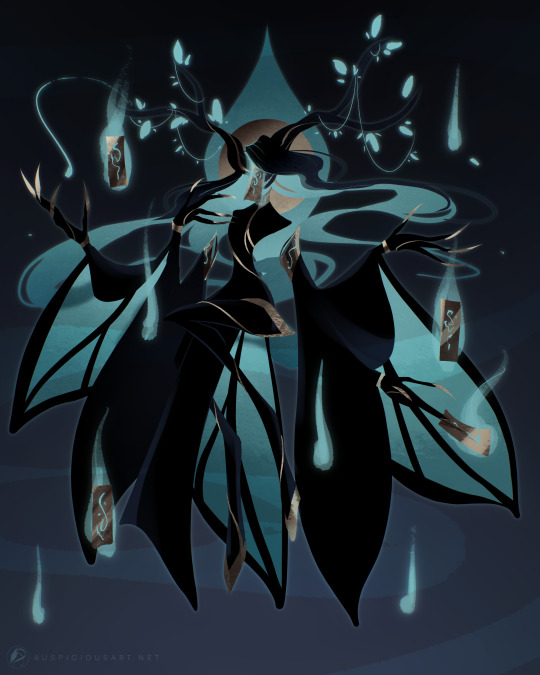
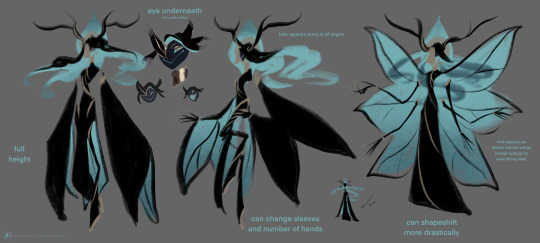
I am Names. You can call me that if you want. To friends… how about Friend? To strangers, Stranger. To those who dislike me, how about Odious? To those I dislike, I can be Vile. If you're unsure, how about Ilk? Or, if you like… you can give me your name, and I'll give you a new one. We could even share. But what are names, exactly? They are titles, they are windows. They are promises and self-fulfilling prophecies. They are identities and they are masks. They are opportunities and chains. Names have power, more power than you might think. So, think carefully… what shall your Name be?
Names (mirrored/any), Edeia of Names. My little indulgence for a fae-inspired Edeia! Definitely just inspiration though. Folklore was not referenced for accuracy.
(They definitely play the "may I have your name" / "may I have your pronouns" game.)
More about them below the cut! And even more about them on TH.
Edeia Site | Edeia Discord | Personal Website
About Names
The Edeia generally known as Names has many names, and many facets of their self to go along with them. Some might think of the countless names as false identities, but for Names, each name they use is one real to them, one in which they'd found themself. They enjoy testing the limits of who they are, who they could be, and who they want to be.
Names also enjoys playing "games"… where they are always at an advantage in one way or another, and/or at no risk of loss. These include deals, gambles, and other arrangements they find interesting. For instance, even if another offers their Name, Names will never offer theirs—if they even have any risk of loss, besides their magic power. One example of a gamble they might play with a human is that if the human wins, they'll give them a name sure to bring them great financial success and stability; if the human loses, they'll give them a name of a pariah. They don't care too much about the outcomes for these humans; they're just as happy to laugh at someone as they are to laugh with someone, generally speaking.
Names does like to give a fair chance, however—or fair enough, however you look at it. They've crafted their abilities so that others' Names aren't immediately revealed to them, for one. They'll avoid finding out others' names and other forms of address outside of interacting with them directly, as it's part of their "game" of getting to know others.
They also enjoy all sorts of music and dance; they collect every kind of instrument and try to learn it, and like to learn all sorts of dances (with a preference for folk dances). They also create their own instruments, compose their own songs, and choreograph their own dances. In their games, a human might find themself relieved that their loss penalty or price for a deal is simply to teach Names a dance, a song, how to use a certain instrument, or an instrument itself. Names might invite others, including humans and Edeia, into their Abstraction for a festival of song and dance.
Names is unrepentantly themself in all their names. They have made themself into exactly who they want to be, after all. They can enjoy good company and friendship, though they don't particularly care if others dislike or grow to dislike them; they are just as happy in solitude, in their music and dance, and in their "games."
History
Names was once an Identity—rather, they were a human that would have become one. Let's call them Ming (名, Míng, meaning 'name'). They were born among the Chinese landed gentry during the Tang Dynasty with the Idea of Identity, and they grew up highly aware of the kinds of identities others had around them. They were particularly drawn to others' names, however: how the names affected them, how those names affected others. Many they knew had two, three, or more—their given name, courtesy name, art name (pseudonyms, or hào), nicknames, and perhaps other titles.
As they grew older and made their own name for themself—or perhaps names for themself—they indulged in the experience of giving and receiving names. Names exchanged with Ming had some magic power imbued in them at that time, though not too much.
It was when Ming met another Actualized Identity, who revealed Ming's state, that Ming realized their magical potential and began experimenting with the extent of their abilities. Through their experimentation, they felt that they did not simply want to be another Identity. They had their own names. They were more than just an "Identity." They sought a deeper understanding of themself, considering each of their names and what they meant; eventually, Ming was, through their magic, able to define their Name. Then, by knowing their Name, they became able to change the essence of themself. Without hesitation, they altered their state of being an Identity to being their own self, and named their Idea as Names.
At the moment of their changes settling in, they felt themself at a threshold, and Actualized.
Names traveled often after that, making their way across various parts of the globe. They stayed for quite a while in Europe, delighted and fascinated by the cultures, and having their fun with humans in certain areas. Names and the activity of some other Edeia around this time led to more and more tales of fae, and Names enjoyed taking on the name of Fae to play around with the people, playing up to that name while still being no less true to themself.
When the time for the Age of Secrecy hit, Names played along with Order's game as well. It was fun to see what they could do within the bounds of secrecy—how for they could go without receiving a warning. As it turns out, quite a bit—so long as humans didn't know there was magic, they could be as superstitious as they wanted, and Names's games worked well in the realm of secrets and uncertainties. They traveled often, sometimes blending their Abstraction with a real forest and inviting in guests to come and get lost in music and dance. After a night of revelry, the human visitors would find themselves asleep in their homes, thinking the experience a fun dream.
After Reunion began, Names continued their games—and was much more open about their existence. They registered with Data and occasionally visited reunited society (often to learn music and dance), but preferred to travel, spend time in their Abstraction, and draw people in to play their "games."
177 notes
·
View notes
Text
Since people expressed interest in the comments about the music I used to write my current fic, I wanted to share some of what I explored to write it. I don't think that you need to know this canon or have read this fic to read this post, though I do spend a bit of time talking about how canon influenced the choices I made. Anyone who has been following this fic knows that it was supposed to be porn, and largely, it really still is for the most part a fic about sex. But I did do a lot of research on music with which I'm frankly not very familiar, and the process was really rewarding.
The fic is Time Signature, if you're interested. This post has a lot about music, electronic music, Chinese music, and music theory, as well as some links to music that interests me and inspired portions of the fic. I don't expect anyone to read anything this long, but it was nice to write it.
Canon. One of my favorite things about both book and drama canon is how in synch WWX/LWJ are cultivation-wise. It’s not just that they can predict the talisman the other will use or the seal the other will cast; they also have the same hunches solving mysteries, the same instincts protecting others, the same ideas about where to go. When writing an AU, it’s important to me to show that synchronization (beyond physical attraction and sex), mostly because I think it’s hot.
In canon, however, WWX revolutionizes cultivation, inventing a whole new method when no one ever thought that possible. I also think this is hot. I also think it’s hot if LWJ thinks it’s hot. Look, canonically, LWJ disapproves of demonic cultivation because it will injure WWX’s spirit and body, but imo there is a reason LWJ is so into WWX, and it’s not just because WWX bugs him. It’s not even just because WWX is really cute and happy and exuberant and everything that’s the opposite of his upbringing. I also like to think that it’s because WWX is a fucking genius, and LWJ doesn't mind the idea of upending tradition and the entire cultivation world as much as it really seems at first that he would; he just struggles with anything that could hurt WWX. So anyway, WWX being revolutionary, in basically a technological sense, is important to me.
Wangxian both play music canonically. LWJ’s playing is noted to be particularly powerful, and WWX’s chosen music is at least one part of his revolutionary cultivation method. Additionally, the song LWJ writes for them is an important plot point. It makes sense that in a modern AU, music is a point of connection, so that is what I chose for their careers.
The final point about canon I want to make in connection to the music for this fic is that this is a Chinese canon with Chinese characters set in China. I don’t think it’s wrong to write AUs set in the west. I have done so, and I think there is value in examining a Chinese canon that has become very popular in the west through the lens of the Chinese diaspora. But I also think that there is a lot of value in a western person such as myself trying to learn and understand the cultural context for a canon that I really like, even if I sometimes get it wrong.
I had decided to set this fic in China because I thought the setting would not strongly feature, which would give me an easy “in” to write something set in a place I don’t know much about. Directly after choosing the setting I chose their careers, which made me realize I needed to do a lot more research—both about the careers but also about the setting--than a fic that was supposed to be mainly porn should have really required.
Music genre choice. Lots of AUs I’ve read have Wangxian’s mutual interest be that they both play western classical instruments. This baffles me, but it’s what I’ve seen, so I loosely started there—ie, I spent some time thinking about what would be revolutionary in western instrumental music, which entailed doing some research on contemporary classical music. There are obviously pioneers in any music genre, folks doing new things, but it turned out I just did not know enough about this genre to really understand what would be truly avant-garde.
I took a step back and thought about the instrumental music I have personally heard that feels really new and different, and Philip Glass was the first thing that came to mind. I first heard of Philip Glass when I saw The Hours, for which he wrote the soundtrack. I still think that soundtrack is one of the most beautiful things I’ve ever heard, and I did use it as inspiration for music in this fic, particularly LWJ’s. More on that later.
Philip Glass is great, but for all his eastern minimalist influences, he is a strong figure in the western paradigm. I did some research on Chinese contemporary instrumental music, but most of what I found had a really western flavor. I think there are two reasons for this—one is that I am in the west searching for articles in English; for all that we like to imagine the internet is universal, search algorithms and search history is actually making it far harder than it used to be to find material with which you are completely unfamiliar. Secondly, western music did in fact have a notable impact on Chinese music, which is fine, it’s still Chinese, but I worried about everything I wrote just sounding like it was about western classical, which is a concern of mine I’ll address more later.
Since I wasn’t finding what I wanted, particularly for WWX, in the “art music” (aka, lowercase “c” classical music, which Wikipedia says is also known as “cultivated music, serious music, or canonical music”—ie, instrumental music with strings, winds, percussion) scene, I realized I needed to examine the other contemporary music, by which I mean everything else. Since I am most familiar with rock, Radiohead immediately came to mind, but Radiohead is a band, and there are lyrics. Though the lyrics are not where the meaning of Radiohead songs lie (the vocals are treated as largely instrumental), if there were lyrics, I’d need to write about them, and I didn’t want to. More importantly, Radiohead is singular in what they do, which makes them difficult to categorize, and this makes them difficult to describe textually. You can say that Radiohead revolutionized rock, or even reinvented it, but that is not really addressing how fundamentally avant-gardeRadiohead is. Describing how revolutionary Radiohead is on paper really is just saying “but they’re different!” over and over again.
What I needed for WWX was a music genre that was revolutionary, an entire school of music that felt cutting edge and frankly, unfamiliar, and for that, I realized I needed my brother.
Some stories about my family. My brother is a music artist who creates electronic music. If you want to understand why it took me this long to get to my brother in this thought process, you should understand a few things about him. First, I love him a lot, but we’re not very close. Second, my brother is probably the quietest person I know—like, idk, LWJ levels of non-talking. Last, I do not understand my brother’s music. I’ve tried! I listened to it a lot! But when I didn’t understand, I asked questions, and my brother cannot explain any of it. He’s an expressive guy! Just not verbally, and as a very verbal person, I have a tough time when people cannot use their words. Like, even asking him what type of music he plays, he’ll say something like, “It’s complicated.” (This is a lie. He’ll look at me and say, “Type?” And I’ll try to explain what I mean. And he’ll say, “I don’t know.” And if I said, “Okay, but if you had to label it?” He’d laugh and say, “Why?” And if I said, “So I can better understand your music,” he’d think for a long time, then look very frustrated, and laugh, and say, “I don’t know?” I think we’ve literally had this exact conversation).
Anyway, possibly through one of these type of exchanges, where I’m grilling him like a school marm and he’s acting like I’m making him take a standardized test he hates (I’m his little sister. Would it be easier to subject him to these horrors if he was my little brother?), I learned that one of my brother’s influences is Aphex Twin. My brother loves Aphex Twin. I . . . don’t. I’ve listened to a lot of him (in order to understand my brother better); I do not like it, and I do not understand it. My brother talks about Aphex Twin like he’s a genius (if and when my brother talks at all). Now, my brother is a very smart guy; it’s not that I didn’t believe him when he said Aphex Twin was a genius, but he also gets . . . swept up by things, and as previously discussed, he doesn’t talk a lot, so I didn’t really understand what my brother meant by this. It took hearing about Aphex Twin randomly, in a couple other places, for me to realize Aphex Twin is a Big Deal. When I looked up Aphex Twin at some point in order to better understand the music my brother makes, I found that Aphex Twin is considered by many to be a genius and also a pioneer. Apologies to all of you who already knew that about Aphex Twin.
Sidenote, my brother’s wife is also a musician, though not professionally. She could have been, considering that she was ranked as one of the top flute players in Texas, and Texas is fucking huge. But no, professionally, my sister-in-law is in cognitive science and linguistics, which you may remember was the career LWJ had in Say More (my fiancée is also a linguist. I also know a few other linguists. My life is convenient for my Wangxian AUs, I gotta say). I mention my sister-in-law because my sister-in-law has enough musical acuity to also recognize that both my brother and Aphex Twin are geniuses, which really helped me to understand that even though I’m not really into this music at all, it really is a Big Deal.
So, I researched Aphex Twin and also went to my brother’s website for his music to find out what the hell this type of music is called, and it turns out there’s not a good name. IDM, which stands for intelligent dance music, is a label Aphex Twin himself famously does not like, and my brother labeled his own music as “acid, techno, house, electro.” Wikipedia said that Aphex Twin is known for techno, ambient, and jungle.
Anyway, into this confusing morass of electronic revolutionary music is where I decided to plunk Wei Ying.
Electronic music. Note for this section that I know nothing about electronic music. I’m writing this post partly to document the journey of discovery I went on to write this porn. I’m not really trying to educate anyone so much as I’m trying to provide insight as to what I researched for this fic and what the references are, in case the fic interested you.
When you really get down to it, music made with electronics has as many genres and styes as music made with more traditional instruments, and the labels are just as confusing (see this Wikipedia list of electronic music genres). For instance, “electronica” just means music made with electronics to some people, but to others it’s more specific. You’ve also got a bunch of other terms: ambient, EDM, techno, house, IDM.
This is all based on what I learned from Wikipedia, but here are some loose definitions as I understand them: There’s ambient, which is really made for background listening, and then there’s EDM (electronic dance music), which is made for active listening—ie, dancing. Within EDM you have lots of genres, such as techno; techno is usually characterized by a specific tempo and repeating structure, and house, which . . . is also characterized by a specific tempo and repeating structure, but the tempo is different. From what I can gather, house is also a bigger tent than techno; ie, many different genres and styles can be house, but techno is more often just techno. (Note that part of the reason all of this terminology has so much overlap is that it originated in different places; techno was invented in Berlin, house in Chicago.) Meanwhile, the list of genres of house is so big that it also has its own Wikipedia page, which is almost as large as the list of electronic music genres.
Note that there is such a thing as “house ambient”, which explodes the entire concept of ambient vs EDM. To aid in that explosion, IDM is described on Wikipedia as including styles such as ambient techo, and “is regarded as better suited to home listening rather than dancing.” What stands out about IDM, and the reason it is featured in the fic, is that it’s known for being experimental. (I’ll add that it emerged in the 90s, which isn’t great for my fic. Whatever WWX is doing, he is on the edge, and 90s music already old to him, even if he’s Aphex Twin’s biggest fan! But alas, my research could not tell me what is happening right now, because you really have to be involved in The Scene to understand what’s new. By the time it’s documented, it’s already really a little old.)
If you are researching electronic music and how it is revolutionary, you’re probably going to get into its evolution and history, since this is a new style of music. And if you are looking into the origins of this kind of music, you’re going to find Brian Eno. And if you’re looking into Brian Eno, you’re going to find minimalism.
Minimalism. Brian Eno is an extremely famous dude. I’d probably heard of him before, but I am very good with big concepts and pretty bad with details, so because I didn’t know anything about the bigger concepts behind ambient/electronic music/minimalism, I never paid attention. Now I’m hearing about him literally everywhere, which is funny, since it’s not like he’s new news. Ezra Klein was literally waxing poetic about Music for Airports just a month ago.
Eno is famous for his pioneering work in ambient music and electronic music, and, as one might expect, electronic ambient. Eno was always doing experimental, avant-garde stuff, and early on he embraced a minimal style. He later coined the term “ambient music.”
What’s interesting about this is that around the same time as Eno was doing this in later 1960s/early 1970s, a new kind of art music was being born in classical circles. This is the capital “M” Minimal music, for which—you guessed it—Philip Glass is really famous. And when you look at Philip Glass’s influences, he was deeply influenced by the minimalism of eastern music, especially Indian and Tibetan music. I couldn’t really find anything saying that Brian Eno was directly influenced by traditional eastern music, but Eno is definitely a fan of Glass and vice versa; they really build on each other.
This ended up just being a very cool intersection for the fic that I didn’t plan. I didn’t end up using it very much, but I must say I was stupidly pleased that the kind of music I was looking into for both of these characters has such deep roots in eastern music traditions. So now let’s talk a little bit about eastern music, specifically Chinese music, since that’s where this fic is based.
Chinese music. I did read a bit about Chinese music for this fic, and I have to say that I still don’t know a lot about it. As stated above, I’m in the west, using my western search techniques, looking for primarily articles in English (though I get Google to translate some things). I also just have a western understanding of music and music history, and it turns out, surprise, different cultures are different, and my entire paradigm for understanding music does not really apply to music from other cultures.
I, and many of us, want music to be a universal language, something that can move through all barriers and touch us in our souls. And it is! I have listened to and loved music not from my culture! But thinking of music as something intrinsically universal and therefore immediately moving to everyone really collapses the rich history of musical tradition all cultures have. Music really is like a language, in that it is built on the culture that creates it; it has its own internal logic; it has style and meaning that depend on the history of that tradition and the understanding of its audience. The brief reading I’m going to do to write some porn will not give me to understand the deep and rich tradition of Chinese music, but also, frankly, even if I turned all my efforts and career to learning and understanding this right now, I still would not have the best comprehension. I don’t even comprehend western music, and I grew up with it. So, forgive me for the paucity of my understanding and knowledge, and please correct me if I make mistakes.
When I think about Chinese music that I know about, I think of two things: modern and traditional. The modern stuff I’m thinking of is stuff like C-pop, but also the things you might hear on the soundtrack for a drama or movie. To me, none of this music sounds that different than western pop or western soundtracks. There are a few reasons for this: one, there are tons of Chinese music that is not reaching me. Two, maybe I just think it doesn’t sound that different because I can only really process what I recognize. Three, in a similar vein, maybe I’m thinking “that sounds like what I know” when really what I know sounds like what I’m hearing. Globalization is definitely doing things to music; if you’re telling me that Asian pop is not influencing western pop right now, I’m going to think you’re crazy, considering the influence and popularity Asian pop has in the US and Europe right now. And four, western music did have an impact on Chinese music, so there’s that.
Obviously, the music genre I chose for Wei Ying falls into the modern sphere, and I certainly looked into the techno/EDM/IDM/electronic/ambient/house scene in China. Articles I found stated it took a little longer for EDM to pick up steam in China, but now it’s definitely going strong. There are some great electronic music festivals, EDM clubs, underground EDM scenes, and EDM music artists (composers and DJs!) in China. Researching these artists was pretty difficult, especially because I wanted Wangxian’s musical discussions to be highly technical, and for highly technical discussions about EDM you are wandering into some very niche spaces. I’m sure such spaces about EDM in China exist, but they’re most likely to be in Chinese.
As I’ve said, globalization is a factor when it comes to cultural difference in music, and I’d add here that because this genre of music is so new, globalization has even more influence, from what I can tell. That said, I do not want to diminish how much influence very specific locations have to do with this type of music. EDM is very tied to clubs (because of the dancing) and performance (because of deejaying, and also because of things like live coding/algorave), which is probably why we get so many granular genres of house—Chicago house is different from Detroit, just for example. Regardless, I stuck with researching a lot of western artists for both the music and musical discussions in the fic, mostly because the music is supposed to be so new and avant-garde that is should not be something overly familiar to the reader, even if they’re steeped in electronic music genres.
Then there’s traditional music.
Traditional music. Traditional music obviously had a huge influence on Chinese modern music. The influence of traditional eastern music on modern eastern music, as well as traditional eastern music itself, is what really influenced a lot of western minimalism of the 1960s and 70s (and onward). To be clear, not all “eastern” traditional music is the same. It’s just as richly diverse regionally as traditional western music, if not more so, given “the east” is fucking huge—though I will say that a lot of people think of western music as pretty monolithic, because folk is characterized as a separate tradition than classical. When you consider ancient western folk, there’s a shit ton of it, and it’s quite diverse. There is also folk music in eastern music traditions, and this is different than music that would have been played in courts and palaces, so there’s really a ton going on.
Traditional music is what people think of when they think of eastern music being “weird,” which is something I really hate. Look, I love being weird; I think weird is cool; it’s great. But weird means unusual, and traditional music is very usual; people who say that just mean it’s unusual for them, and they should think about their words. What they’re trying to say is that traditional eastern music will sound very different for many western listeners, even though, again, we like to think of music as so universal, actually!, because it’s based on math, actually!, and math is so universal!!! The truth is that math is patterns, and patterns are things that your brain recognizes when there are familiar elements, and when there are unfamiliar elements your brain has trouble recognizing the pattern. So, again, music is a way to communicate across all kinds of boundaries, but it is not a universal translator. (But it does make you wonder . . . if Lan Zhan played Inquiry, could Aeneas answer???)
Regarding the unfamiliar math, what we’re talking about is scales. I think most people know this part. Eastern scales are based on math, just like western scales, but the frequencies are divided up differently. Among other things, traditional Chinese music did not use equal temperament, which means depending on what note you start with, the intervals for all the notes on the scale were be different. A way of thinking about this, at least as I understand it, is that a piano is even tempered. All the notes are always the same whether you’re playing in C major or B flat, because you have no control over the frequency produced when you press the key. But if you’re using just intonation—say you’re using an instrument with just a few strings—you’re adjusting the frequency of the note to match your scale. It requires extremely precise hearing and playing ability.
Notation for traditional Chinese music was really different than how I as a westerner understand it. For one thing, it didn’t include rhythm, and for another, it represented more a framework for improvisation than every single precise note. (See Gongche notation, Wikipedia.)
Authorship was also thought of pretty differently. When I googled “great Chinese composers,” the only results I was getting were twentieth century. There are some great ancient Chinese composers, but I had to do a lot of digging to find them, and trying to find someone like the Chinese equivalent of Beethoven is just the wrong approach. When you get right down to it, this really seems to be about the fundamental difference between western individualism vs eastern collectivism and community-based thinking. The individual artist is not the hero of the story. That said, the tradition of the music is very heroic. For instance, the notation allows such variation that the same piece can really build and grow through different artists, much like a story through oral tradition. Additionally, for an artist in an ensemble piece to stand out would really be quite rude; the point is not the individual talent of the musicians but the fundamental beauty of the piece. (This was a particularly hard thing to research, and I mostly found out what I laid out above from various folks answering questions in forums. The best one I found is here.)
Another thing is that harmony, as we think of it, was just not really a thing in traditional Chinese music. The focus was on a melody, which is where minimalism comes in. I’d add here that the “as we think of it” is pretty important, because the western paradigm, including western music language, is not super great at really capturing the nuance of Chinese music. I am terrible at tracking my sources when I research stuff for fic, so I was trying to find some of them now, and I came across this article, which examines the harmony that did exist, but how different it is from what we think of when we think of western harmony.
Despite the reading I did on this subject, very little about Chinese traditional music made it into the fic. I do have Lan Zhan reading a book on traditional music that he hates. This isn’t based on a book I found, but rather to show that Lan Zhan isn’t really into the idea of musical “purity,” that is, ideas of what you should and shouldn’t do with music. That said, I’m not really aware of what strictures around traditional Chinese music are like, or what the Chinese thought is on that. I am aware of how deeply restrictive western thought is regarding music theory, and that’s really where that part of the fic was coming from.
I’d originally had Lan Zhan reading a book on western music theory and very deeply hating it, but I also felt like having him read a book on western theory could reinforce the idea that he’s working within a western paradigm, when really the whole point is that this Lan Zhan very intentionally uses traditional music values. Due to his inspiration from Wei Ying, he’s breaking the norms of how that music works, but he's not necessarily making it western; he’s making it avant-garde. Basically, my inspiration was a Chinese Philip Glass, but I didn’t want to say that because as mentioned above, Glass is still western, no matter his influences. That said, Wei Ying does compare Lan Zhan to Philip Glass and also Tan Dun, who you might recognize as the guy who did the soundtrack for Crouching Tiger, Hidden Dragon, among many other very famous projects.
Tan Dun has in fact been called the Chinese Philip Glass, which is probably not very respectful to Tan Dun, who is himself an incredible (and experimental!) composer. I should note, however, that Tan Dun is Chinese American—he was born in China, but got a degree at Columbia and has lived in New York since. Also, he is particularly famous for marrying Eastern traditionalism with western style, and that really wasn’t what I wanted for Lan Zhan. I didn’t want Lan Zhan to be incredible because he was using western traditions, though he is familiar with them and can make very talented use of them. A lot of very famous Chinese modern composer are famous for that, and that music is still very Chinese. That said, I felt that if I made that Lan Zhan’s style, it would feel like I was saying Lan Zhan’s music is special because it’s western, and that was something I really wasn’t keen on.
In the end, I possibly did the fic and traditional Chinese music a disservice by having Lan Zhan read his book and hate on it. One of the whole reasons western music theory sucks is it can be pretty racist, and that’s what I was trying to avoid, but by conflating my rage at western music theory with eastern, I didn’t really help things much. But anyway, since I’ve now mentioned it, let’s just take a slight detour to talk about what I mean by racist music theory.
Western music theory racism. There’s a scene in the movie Tár that really solidified my feelings on the subject. In it, a student who identifies as BIPOC and pangender, says they don’t really have much use for Bach because of Bach’s misogynist history. The extremely famous director, Tár, played by Cate Blanchett, lambasts the student for “cancelling” Bach because of Bach’s personal life. The student goes on to say that they really just don’t have much interest in cis male white composers, and Tár continues to lambast the student for considering things like gender and race in conjunction with the art.
My understanding of this scene was that it was demonstrating that Tár is a jerk, so full of herself that she can’t listen to other voices, and so steeped in her 18th century western ideas of genius that she’s literally silencing the music voices she’s supposed to support. That was not most people’s reading of the scene, and in retrospect, possibly not the intention of the film. It seems rather telling that not a lot is known about Bach’s misogyny or lack thereof; there are plenty of other “great” western composers that are known to be worse in terms of misogyny and abuse, and yet the film did not make this scene about them. In retrospect, maybe that scene wanted to paint this student as kind of ignorant for cancelling Bach, and Tár really puts them in their place when she describes how art is more important than the artist.
Fuck that. I certainly believe that art is more important than the artist. JK Rowling sucks; that doesn’t mean I will stop loving HP fic and the part it’s played in my life. But the ugliness of the scene is that it hinges on importance of Bach, and look here, shocker, Bach is not essential, just as JKR is not essential if you decide you don’t ever want to familiarize yourself with the literature of TERFs. Even if you want to be a musician and create or conduct music, Bach is just not essential.
He’s pretty important if you want to be a western music historian, true, but when we talk about music there are many, many music traditions that are incredibly worthwhile and important that not only weren’t created by cis white men, but also weren’t ever derived or influenced by cis white men. If you think that you need Bach to know and love and create and perform and conduct music, it’s because you’re operating in a single paradigm that has become yes, universally known, but also for that reason oppressive and imperialist. I am not saying western classical music is bad because it’s imperialist, just to be clear. Bach’s great! Hate ‘im, but I do love me some Beethoven and he was also very cis and male and white and also a complete douche! What I’m saying is that forcing this music tradition on others is deeply imperialist, and it happens all the time.
Anyway, this is really a tangent, because despite my very good intentions to write about Chinese music, as I have stated, almost everything I used for reference was western, even a lot of the stuff I listened to. Maybe I just wanted to acknowledge that that’s a little racist, even though I tried not to be. Maybe I also wanted to hate on Tár and leave you with this interesting video about white supremacy in music theory.
References. Finally, we’ve reached the part I had originally intended to post, which is why I started writing this. Below are the essays and articles I used to write this fic. They were used in three ways: 1) to describe the music (though I also listened to things, see next section), 2) to inform Lan Zhan’s critiques and Wei Ying’s ideas—though I read a lot of essays to do that, just a crazy amount considering how little of the fic is actually about that, and 3) to describe the reading material Wei Ying and Lan Zhan exchange.
Music Beyond Airports – Appraising Ambient Music
This is a series of essays largely focused around Brian Eno’s Music for Airports, though there’s a lot of other stuff as well. I didn’t read everything in here, but the collection is absolutely fascinating. “Ambient House: “Little Fluffy Clouds” And The Sampler As Time Machine” is one of the “articles” Wei Ying sends Lan Zhan; meanwhile, the collection as whole is what Lan Zhan sends Wei Ying when he says he’s been reading about ambient house. Additionally, “Adaptive Game Scoring With Ambient Music” really influenced Lan Zhan’s commentary about arpeggiation, the first time he comments on Wei Ying’s music.
Counterpoint - Tracking in the Music of Aphex Twin
I have some embarrassment about this, given that the article is about counterpoint, and as I have discussed above, eastern traditional music doesn’t really employ that in the way westerners think about it. However, it’s also pretty backwards to restrict Wei Ying to traditional eastern music, as modern Chinese music includes plenty of counterpoint, and part of the point of the fic is that Wei Ying is doing entirely new things that haven’t been done before. Well. They’ve been done by Aphex Twin, as described in this piece, which also describes the first piece that Wei Ying plays for Lan Zhan in the fic, in the car. I did lift the phrase “pedagogy of counterpoint,” and could not decide whether it was long enough or significant enough to credit in the fic.
Unequal Temperament: A Review of Aphex Twin’s SYRO
I can’t remember what I used this article for. It’s an interesting read.
Reverb Machine (the entire website)
This is the site I kept returning to over and over and over again. Most of the articles about electronic really focus on either the equipment used or chords. In the fic, Lan Zhan isn’t supposed to know much about equipment or how any of it is used, because he does not do electronic music. Also, I didn’t really want to talk much about chord progressions, because those discussions are steeped in western music theory, and I wanted it to be possible for Wei Ying to be using the kind of scales traditional Chinese music used, even if a lot of modern Chinese music does use an even-tempered 12-tone scale. However, this site has a lot, and I ended up returning to it again and again so Wei Ying could say an offhand thing about reverb, and to describe certain things.
Notably, Wei Ying’s track, sex.mp3 is loosely based around Trent Reznor’s and Atticus Ross’s soundtrack to The Social Network. I haven’t even talked about Trent Reznor, but he was also someone I considered deeply when I started thinking about making Wei Ying do electronic music. In case you don’t know, Reznor was the artist behind Nine Inch Nails, but in later years he moved on to more experimental things, including movie soundtracks. Side note, movie soundtracks and video games is where a lot of these experimental artists doing either minimalism, ambient, or electronica, or a combination of all three end up, and I ended up reading a lot about video game music.
But anyway, when I saw the Social Network, I came out of it 1) admiring Aaron Sorkin and wishing I didn’t admire Aaron Sorkin because he’s kind of a douche, 2) shipping Mark and Eduardo way too much for my comfort, 3) going HOLY SHIT THAT SOUNDTRACK. Turns out I was not alone in finding that soundtrack totally different and new compared to anything I have ever heard, because as it turns out, it really was—wait for it—revolutionary. I understand that I have now said that about Glass, Eno, Radiohead, and Aphex Twin, but hey, people are doing things in music. Like I get that pop and hiphop artists are revolutionizing their genres all the time, but also it is possible for music as we know it to be redefined, and it’s not just the weird shit you hear that sounds like noise (there is a place for the weird shit that sounds like noise, and Brian Eno is closer to it than any of the above mentioned; I am not dissing weird shit that sounds like noise, because it is part of how we get where we are going).
Anyway, I used this website’s essay about The Social Network’s piece, “In Motion” to describe some of the music and inform some commentary on it.
“East Meets West: A Musical Analysis of Chinese Sights and Sounds, by Yuankai BaoSounds, by Yuankai Bao” by Jiazi Shi
This was the only essay I found that really had the extremely niche technical jargon that I really wanted for the fic that was also about Chinese music. You’ll note that it’s about a Chinese composer who is, again, famous for marrying eastern and western tradition, but this was what I could find in English, and I searched a lot. You’ll note that Lan Zhan’s very specific comment about the key change is something very directly inspired by this grad school dissertation. You’ll also note that this is where I found “Flowing Stream,” including a description of the song and the lyrics.
Music. A lot of fics like this one will link you to a specific piece that the character is playing. I could not do that, because the music in my fic is very intentionally made up. As I have been saying, the whole point is that Wei Ying is pushing the boundaries, inventing music that does not exist. So is Lan Zhan, by the end. I listened to music to inspire the descriptions, but it is not what they are playing, and almost none of it is Chinese. I’d be very interested in finding some Chinese music that is working on some of the principles of minimalism and electronic that these pieces employ.
Aphex Twin – Stone In Focus
Now you’ve come to the climax—this is really the story of how I learned to love Aphex Twin. This piece makes me cry. It’s what I used to describe the piece that has the remix of Lan Zhan’s guqin piece from 12 years ago. Obviously, the guqin piece mentioned in the fic is the canonical piece, Wangxian, but I find Wangian in the drama cheesier than I want it to be, and this Aphex Twin piece doesn’t have the Wangxian part. It’s just the sad longing part before Wangxian enters, but you’ll also notice that there are no flutes! Again, this is not the piece Wei Ying wrote; it’s just what I used for the description.
I didn’t link to the YouTube video I was watching, because the video was a collection and this didn’t come on until after minute thirteen. But that video just has this very sad tunnel that looks like maybe it’s for a train, and the rain is falling, and that makes me cry as well: https://www.youtube.com/watch?v=BHl4NVytGpo&t=1074s
Book featuring Ndidi O - Hold On, I'm Coming
Wait, you’re saying, this is not electronic/house/ambient at all; this is just a trick to get me to watch one of your favorite wangxian vids! You’re right! But frankly, I was not focused on the genre when describing the music; I was focused on getting the feel of it that I wanted. The opening sequence to this was what I used to describe the track they make love to. (Lan Zhan starts making out with him and kind of slowly humping him to the track with the wangxian remix, but then Lan Zhan demands he plays something else, and this is what I listened to to get the feel for it.)
This pieces is a cover, and frankly, I can’t find out much about it. But just thinking about it turns me on and makes me cry and makes me feel so much, I can’t do it too often.
Trent Reznor and Atticus Ross – “In Motion,” from soundtrack to The Social Network
As noted above, this piece inspired sex.mp3, but I will say that the article I linked above about this piece, as well as the memory of the soundtrack itself, inspired descriptions more than listening to the piece itself. In the fic, sex.mp3 is initially described as “violent.” This was because I didn’t know if the track would play a big part in the fic, and then when it did, I really had to change to both to fit the meaning and the flavor I wanted; it became “anxiety inducing,” and that’s when it became “In Motion.” “In Motion,” however, is kind of too bright and peppy to really be sex.mp3, though I will say I was trying to listen to it just to write this section of the post, and I had to turn it off. It makes me SO anxious.
Philip Glass – soundtrack to The Hours
I’m linking the whole soundtrack, because in the fic Lan Zhan writes several related pieces, which is what this soundtrack is. I can’t even recommend one piece on this soundtrack, because it’s the thing as a whole that really makes you cry, and I can’t say I listened to a specific part of it to describe Lan Zhan’s music, because I know it so well that I only have to listen to a small piece to get all of it.
Flowing Water, played by Chen Leiji
The part this played in the fic is obvious. I listened to at least five versions of Flowing Stream/Flowing Water, and this is the one that I like the best. However, like all the renditions I listened to, the piece eventually becomes pretty complex and different than I wanted for Lan Zhan. In fact, what the narration describes as “showing off technique” is what I found in all recordings of this piece. I guess if you’re going to play “Twinkle Twinkle Little Star” on YouTube you’re going to do something impressive with it, but I will say this piece is still very close to what I wanted.
I will also say that when I searched for this piece, as well as several other traditional songs, the search results had a lost of stuff that said you can listen to these pieces for tranquility and calm and meditation. I suggest listening to this one as extremely passionate and longing, and you’re going to get a lot more from it. If you resign it to the background, yeah, it’s kind of nice. If you let each note really speak to you, you’re going to really ache in a beautiful way.
Brian Eno – Ambient 1, Music for Airports
After hearing so much about Eno and Music for Airports, I was a little afraid I wouldn’t like it. After all, this isn’t really my genre, and witness how long it took me to find something I liked by Aphex Twin. However, I really needed some inspiration for the piece Wei Ying composes after Lan Zhan breaks them up, so I started listening to it.
The opening to this album is not the heartbreaking thing that the fic describes. It in fact does break my heart, but that is because there is something so sweet about it, lonely and sweet, but also perfectly fine being by itself. This piece is like a child alone in a room, figuring out blocks. This piece is like a cat on a piano, content with its nonsense noise. This piece is what it’s like to be alone and to be fine with that, to love from afar and be fine with that. It still brings me to tears, listening to it.
Radiohead – Everything in its Right Place
Apparently I did not succeed in writing all the music without Radiohead. I will say it happened because I happened to be watching a TV show that just happened to use this song right when I needed something powerful. I was already thinking about them, because my BFF was listening to a podcast about In Rainbows, which explains the children shouting “Yay!” in 15 Step. I really wanted something other than rain to get sampled in Wei Ying’s music, and my brother has specifically used his children talking or his babies crying as samples. Once Lan Zhan knows about A-Yuan, I wanted to use that idea, so I listened to 15 Step again, which is far too peppy for what I needed. But then Everything In Its Right Place came on, and it’s actually way too melancholy for what I needed, but that doesn’t really matter; I just needed to get a few notes described, so this is what I used for inspiration for what Wei Ying plays Lan Zhan after he admits to being in love with him. I will just say that re-listening to this song really does remind me of just how much Kid A means to me, but also how much it means to, like, music. There was really nothing like it at the time.
-
I will end this post by saying that I am not, in fact, a "music" person. So many people need and rely on music to get them through tough times. I mostly don't care about it. I don't have a Spotify account, and I can't imagine taking the time to really curate playlists.
But one thing I can say about me and my tastes is that I'm interested in learning. I want to try new things and hear things that I haven't heard before. To be a little self-aggrandizing, I think that that's a good thing. I think it makes me a better person to work on listening to things that I'm a little unfamiliar with and learn what's great about them. I think I got to do that quite a bit writing this, even though in the end I used a lot of pieces I was familiar with to do the actual writing. I hope that maybe someone reads this and decides to listen to something new, just like I did.
63 notes
·
View notes
Text
By the Numbers! With Bonus Fan Labor info -
Signups close later this evening … shall we see where things stand with just hours to go?
At present, there are 686 creators signed up with 928 auctions in 295 fandoms, PLUS 116 creators willing to work in ANY fandom.
Guys. GUYS. That's more than 100 offers more than last year!
Offers break down as follows:
598 Written fanwork (fic, fan poetry, etc)
136 Fan art
105 Fan labor (beta services, translation, Brit-picking, typesetting, etc)
60 Podfic
18 Other Digital Fanwork
7 Video
A bit of info on our fan labor offers —
Among our fan laborers are folks offering assistance with cultures in:
various US states
South Asia
Russia
Mexico
England
Germany
France
Canada
Italy
as well as with:
Catholicism
Judaism
Additionally, there are offers for specialist knowledge or sensitivity reading for:
Disability
LGBTQIA
Sports
Autism
non-combat PTSD
Emergency Services
Blindness
Accounting and taxes
Medical equipment
Engineering
Sex work
Law and court procedure
Medicine (trauma and general surgery)
Scientific knowledge
Teaching
Tea and Coffee
History
Art history (generally European)
Asexuality
Libraries
BDSM
Leather/kink
Forensics
Funerary services
Shibari
Type 1 Diabetes
Choir and theater
Musical instruments
Chronic pain/illness
Knitting
Dance
Hiking
Immigration/Xenophobia
Familial abuse
Sexual abuse
Bookstores
Alpaca and sheep management
Smallholding
AND we have various translation offers for:
Catalan
Chinese
Filipino
French
German
Italian
Portugese
Russian
Spanish
Vietmanese
In our supported orgs, most creators are opting to leave the choice to their bidders. Those who are specifying orgs are most often selecting MECA, Sherlock's Homes, In Our Own Voice, and Never Again Action. Orgs that could use more love are Together Bay Area, Deploy/US, Wildlands Restoration Volunteers, Bellingcat, and Pollinator Partnership.
Stay tuned for a last look at both listed and unlisted fandom rankings in the last hours before signups close … which is SOON!
But for now — signups are OPEN!
#fth 2024#fandom trumps hate#fanworks charity auction#by the numbers#fan labor#signups close soon!#do the thing!#setting records!
46 notes
·
View notes
Text
Highlights from the Giffarine live ❤️


When they introduced their names in chinese, Mile said the wrong name, he said Apo’s (ajdksks it’s not the first time happening) and his reaction is very cute:
Q&A
Q: In the acting career, which role is the most challenging?
Apo: I think that Khem, that i play in Man Suang, is the hardest one because he’s a folk dancer. I had to cut my hair like this. (me: cries a river)
Apo asks Mile: Which habit/character do you like about me?
Mile: Is this a trick question to get me to compliment you? Haha, it's the attention to detail, and being a very focused person especially when working.
Host: Nothing about his looks/apperance?
Mile: The question is about personality, but he's handsome too....he's also very talented, especially in acting. He has the skills and focus
Apo: I'm getting flustered.... but it's all possible because of the team too
Q: What music genre do you like to play the most, and what music genre would you like to produce?
Mile: If it’s an instrument, it's the guitar, but i also like ambience sound with different instruments. If I were to produce, i’d produce blues and rock music, cause there's ambience element and it can become a great piece of art.
Q: Do you want to work together again?
Mile: That's it? Yes, yes, yes. That's really all? (omg so many yeses and so much enthusiasm dkasjkd)
Apo: Follow-up question is: what kind of work do you wanna do together?
Mile: We have the period film, but for the next one I’d like to do a horror/ghost movie.... i wanna be the ghost, it'd be cool.
Mile to Apo: Which city in China you want to go to the most?
Apo: The hardest question
Mile: Because you wanna go everywhere
Apo: True. I wanna go backpacking
Mile: Across the Great Wall
Apo: Yes, I really wanna go, did you go?
Mile: Not yet! (that’s an invite y’all!!!!!)
Q: Share something that no one knows that your shy about.
Apo: I think, many know this, but it's when I walk, I don't really look at where I'm going, so I would walk and trip or miss a step, and would find myself locking eyes with someone and it's very embarrasing. When I miss a step, I try to act cool.
Mile: For me, I like eating and trying new things. So on set, when there's food or when people bring food, I really want to eat it but i have wait or have to restrict myself. Like during KinnPorsche, I wanted to eat so much but i had to restrict myself, so I would sneak a few things. And people started teasing me saying I'm a bear. Po saw it too sometimes.
ROCK-PAPER-SCISSORS ALWAYS WITH THE SAME RESULT LMAO


MILEAPO POLAROIDS

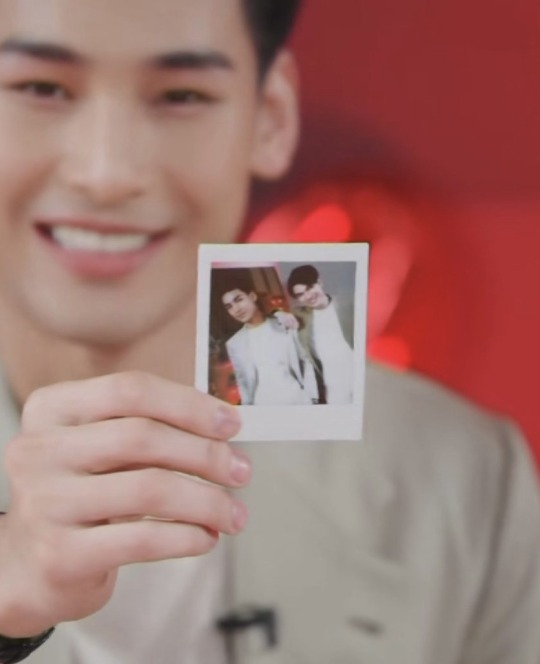

MILEAPO MATCHING EXPRESSIONS WITH THE ELEPHANT

Final bonus: sexy pose 🔥

#they’re always very cute when they’re together#🥰🥰🥰🥰#i dont like apo’s hairstyle but it’s for the movie so it’s for something important#i hope he likes himself in it <3#kinnporsche#mileapo#mileapo x giffarine
166 notes
·
View notes
Video
first part by 一只低调的Au | second part by 川子唢呐
107 notes
·
View notes
Note
do you have any recs for more folk-influenced women's noise projects? i really like svitlana nianio and aine o'dwyer and i'm wondering if there's more similar stuff out there
Hello there, it's a very interesting question! There's plenty of artists who mix folk with experimental/noise/contemporary. Here's a list of few I can think of right now:
There's Księżyc [x], a 90s experimental classic from Poland - it's a whole band, but fronted by two women.
Adela Mede [x] is a Czech artist creating contemporary sound collages with some folk vocals
Maryana Klochko [x] - an Ukrainian artist, her style ranges from more electroacoustic to more trip-hopy/electronic, worth checking out few of her tracks to get a range (I like the song Kvity, which kind of changes from one to another)
Tomoko Sauvage [x] - Japanese artist hugely inspired by various music folklore traditions, such as Carnatic water-bowls instrument
Julia Ulehla / dalava [x] - Czech vocalist, composer, ethnomusicologist "With her husband guitarist Aram Bajakian, she initiated a new line of performance research based on the ancestral song tradition of her father’s lineage, sourcing folk songs collected and transcribed by her great-grandfather, biologist Vladimír Úlehla".
Daina Dieva [x] - from Lithuania. Her works aren't maybe the most folklorish, but their closeness to the world of nature makes me put her in the mix
Audrey Chen [x] - Chinese-American artist mixing cello, voice and analogue synthesizers to create hauting compositions
Sainkho Namtchylak [x] - is a Tuvan experimental singer, known for using Tuvian throat singing and overtone singing named Khöömei. She mixes elements of east asian culture with genres such as avant jazz or electronica.
For more Slavic avant-folk check out this this compilation by In Crudo: [x] it's not all-women but features some inspiring women artists (Svitlana Nino and Księżyc included)
One can mix folk traditions with pretty much any genres I tried to stick to your artists of reference, but it's hard to find something *just like that* and nothing else - there are many more artists than these I've mentioned!
60 notes
·
View notes
Text
Today's translation #570
Yuri!!! on CONCERT pamphlet, Guang-Hong's music
Matsushiba Taku commentary
La Parfum de Fleurs, The Inferno O.S.T from "Shanghai Blade"
Part 1.
Here, I'm going to talk about the two tracks written for the Chinese skater, Ji Guang-Hong.
First, about the short program music, "La Parfum de Fleurs". We discussed that this should be music that will be uniquely for a Chinese skater.
To achieve that, in my head I had the image of a "soundtrack to a Chinese movie", when composing this track. Violin, played like a kokyū, is what gives this music an authentic Chinese feel. In classical music, it's a long tradition to nonchalantly add in a little unusual techniques, that are used for folk instruments, just like this - for example, in a very well-known Csárdás, a violin technique distinctive of Romani music is used.
A feature of this track is this kind of tradition with a twist. The beginning of my work of this music was this playful premise, that if somebody was to try to copy the technique of a violinist, who also knows kokyū music, this is surely how it would sound like.
9 notes
·
View notes
Text

Peter Eötvös
Hungarian conductor of modernist music who went on to compose operas with texts ranging from Three Sisters to Angels in America
The Hungarian composer and conductor Peter Eötvös, who has died aged 80, is now best known for the 12 operas that he wrote during the last 25 years of his life. Before that, he played a leading role as a conductor specialising in the promotion of European musical modernism.
Premiered in Lyon in 1998, the work that launched Eötvös’s career as a successful opera composer was Three Sisters. The libretto, written with Claus H Henneberg, reworks Anton Chekhov’s play into a series of three “sequences”, each offering a version of events from the point of view of a single character; no fewer than four roles are taken by countertenors.
From then onwards, he frequently added new stage works to an already growing number of concert works in an extensive output notable for its radiant lyricism and brilliant orchestration. By extending the modernist origins of an approach rooted in the music and ideas of Pierre Boulez and Karlheinz Stockhausen with the aid of deeply considered investigations of other music of cultures beyond Europe, Eötvös gradually found his own voice.
Stockhausen had already drawn on Japanese musical and theatrical traditions, and Eötvös’s earliest opera, Harakiri – based on the ritual suicide of Yukio Mishima – was composed as far back as 1973, while both composers were working together in Osaka. Subsequently, however, Eötvös’s style – variously influenced by Chinese as well as Japanese traditions, by Indian, African and Basque musics, by jazz and, not least, by Béla Bartók and the folk repertoires of his native Transylvania – developed much of its individuality from interrogations of those cultures that went far beyond any mere cultural tourism.
His instrumental compositions, as well as his operas, often spring from such sources: the large-scale orchestral work Atlantis (1995), for example, draws on Transylvanian dances that act as a symbol of a lost culture associated, for the composer, with renewed hope. In later years he received many commissions from the world’s leading orchestras: in 2016, for instance, for Oratorium Balbulum, to a text by Péter Esterházy, for the Vienna Philharmonic Orchestra, premiered at the Salzburg festival. Ruminating on a variety of topical political issues, from the 9/11 terrorist attacks to relationships between countries, this work is typical of Eötvös’s social and political concerns.
But his operas already seem likely to represent the most enduring and surprisingly varied dimension of his output. Adapting novels and plays by writers both classic and modern – including Jon Fosse, Jean Genet, Tony Kushner and Gabriel García Márquez – these works demonstrate both Eötvös’s wide literary ambitions and his willingness to explore a variety of different dramatic approaches, comic as well as tragic. He was assisted in devising some of these opera libretti by Maria Eötvösne Mezei, his third wife.
Le Balcon – its libretto, by Françoise Morvan, André Markovitz and the composer, derived from Genet’s now classic tale of power struggles within a revolutionary setting – was first seen at Aix-en-Provence in 2002. Mezei’s libretto for Angels in America (2004) boils down to less than three hours the original seven hours of Kushner’s play about HIV/Aids.
Several of his operas have been seen in the UK. When his Márquez-based Love and Other Demons was produced at Glyndebourne in 2008, Eötvös became the first non-British composer to have a stage work premiered there. Described by the composer as “a bel canto opera”, it explored illicit love, superstition, race and demonic power, with a libretto by Kornél Hamvai. The music underpins the drama with an innate understanding of how orchestral forces can enhance the overall effect; though indulging in some gorgeous sounds, the composer displays the rare knack of knowing when less can sometimes be more powerful than more.
Eötvös’s final opera, Valuska – also his first with a libretto in Hungarian, by Mezei and Kinga Keszthelyi – was drawn from the novel The Melancholy of Resistance, by László Krasznahorkai: a tragi-comic, surreal story centring on a newspaper delivery man and the arrival in his small town of a circus with, as its star attraction, the world’s largest taxidermied whale. Valuska was premiered in Budapest last December.
Eötvös was, like his older compatriots György Ligeti and György Kurtág, a native of multi-ethnic Transylvania – then in Hungary but subsequently transferred to Romania; his birthplace was Székelyudvarhely. The turbulent final months of the second world war caused his family, including his mother, Ilona Szucs, to flee westwards. She was a pianist, and his father, Laszlo Eötvös, was a lawyer. Peter’s early childhood was spent in Miskolc, a northern Hungarian town where he first met Ligeti. The latter was already becoming established as a composer and teacher by the late 1940s, and the two remained in contact.
Eötvös studied piano and composition at the Franz Liszt Academy in Budapest from 1958 onwards; after advice from Zoltán Kodály, János Viski became his composition teacher. He soon gaining a reputation for improvising to accompany silent films and composing scores for both cinema and theatre.
In 1966, at the age of 22, he moved to Cologne on a scholarship to work with Stockhausen. He also studied composition with Bernd Alois Zimmermann and began to conduct. When I first went to the Darmstadt Summer School, in 1974, I recall Eötvös not only as one of Stockhausen’s closest acolytes but also as a member of a recently formed group of young Cologne-based musicians calling themselves the Oeldorf Group and specialising in live performance involving electronics.
From 1978, after Boulez asked him to conduct the opening concert of IRCAM, his Institut de Recherche et Coordination Acoustique/Musique, in Paris, Eötvös found fame as a conductor specialising in all the latest compositional trends that helped to drive the global modernist agenda of the time. He quickly assumed the position of musical director of Ensemble Intercontemporain, IRCAM’s flagship chamber orchestra.
He conducted the world premieres of Stockhausen’s operas Donnerstag aus Licht (1981) and Montag aus Licht (1988). In the UK, he conducted the Covent Garden performances of Donnerstag in 1985 and was principal guest conductor of the BBC Symphony Orchestra from that year until 1988. He worked with the London Sinfonietta and also conducted Leos Janáček’s The Makropulos Case at Glyndebourne in 2001.
It was only after relinquishing his duties with the Ensemble Intercontemporain, in 1991, that Eötvös really came to the fore as a composer. With his new status on the European scene, and the political events of 1989 onwards, came new responsibilities.
He taught conducting and contemporary chamber music in both Karlsruhe and Cologne in Germany. Having already founded the International Eötvös Institute for young conductors and composers in Budapest in 1991, he went on to establish the Peter Eötvös Contemporary Music Foundation in 2004. It was at this moment, when Hungary joined the European Union, that Eötvös and his wife Maria – who had both previously lived in Cologne, Paris and then Hilversum in the Netherlands – finally moved back to Budapest.
A son from Eötvös’s first marriage, to the actor Piroska Molnár in 1968, predeceased him. In 1976 he married the Taiwanese-German pianist Pi-hsien Chen, with whom he had a daughter, Ann-yi. They divorced and he subsequently married Maria Mezei in 1995. He is survived by her, Ann-yi and by two stepsons from that marriage, Peter and Daniel.
🔔 Peter Eötvös, composer and conductor, born 2 January 1944; died 24 March 2024
Daily inspiration. Discover more photos at Just for Books…?
8 notes
·
View notes
Text
Okay, so you all know I did Brozone Headcanon of a Vietnamese troll speaker and give you a little bit of its history so I’ll be extending on it a bit more just because I love to share my culture with other people I don’t think I appreciate my culture enough because I live in the state
—————————
Okay, again I was saying that there is a tribe in the trolls village so far away that no trolls has ever heard of it not even Queen Barb or
Queen Poppy has ever heard of them.
They are known as the V-pop trolls (Vietnamese pop trolls) but there's not just pop Vietnamese trolls there's also Vietnamese music genres that the trolls lived in V-pop village with the Viet pop trolls.. let me explain…
(Also this is just my Oc headcanon I did do my fullest research on this if you still want to learn more fill free to look them up)
—————————
You have the Vietnamese Folk Music Trolls: They are extremely diverse just like the folk music trolls they can be classified by their melodies,instrument and much more
Then you have your Ca trù trolls: They are a popular folk music which have begun with a female (troll) singer who is charmed her enemy with her voice and they are also known as hát co đầu or hát nói their music is through storytelling and it comes from Northern part of V-pop village
The Chấu Văn Trolls: They also came from the northern part of V-pop village they are also a traditional folk music which combines with both singing and dancing their music are super poetry and they are combine with variety of instruments,rhythm,pauses and tempos
Ah Floyd’s favorite The cải lượng Trolls: they are a reformed theater is a form of modern folk opera in V-pop village they are blended together with classical music and modern spoke drama and did I mention they can be emotional 🥹 and they are from the southern Vietnamese folk music
Thế Quan họ trolls: They are also Vietnamese folk style music and is characterized by antiphonal nature with alternating groups of females (Trolls) and male (Trolls) singers issuing musical challenges and responses
Then you have the almost well known genres the V-pop just like K-pop Trolls: They are a abbreviation of Vietnamese pop music which it was from the 1990’s to present day many young trolls would listen to V-pop also their songs are in Vietnamese like rap and much more…
Than you have the Nhạc do Trolls: They are “called the red music” is kinda similar to V-pop but their music began soon after the beginning of the 20th century during the French colonial period their music is kinda upbeat (at least that what I think I only listen to it once)
—————-
So I have talked a little bit about the Vietnamese instrument so I decided to write down what instrument I think brozone + poppy & Viva would played…
—————
John Dory:
I could see him playing the đàn đày basically is a plucked lute with 3 strings with a trapezoid wooden body and a very long wooden neck w 10 rised frets
He could also Played the Dan Nguyen is a two-string southern guitar
Bruce:
I can see him playing both the Bamboo Flute and a Dan Ty La which is a Vietnamese traditional orchestra is a pear shaped like instrument which has twisted strings
Clay:
Although there’s plenty of Vietnamese traditional instruments I would see clay killing it at the đàn Tam thập lục it looks like a piano but no is a hammered dulcimer w 36 metal strings and it used in various Vietnamese music genres and drama as-well this instrument is similar to the Chinese version which is called a Yangqin
Floyd:
Being in his sensitive nature side he would crushed it at đàn bầu is a Vietnamese string instrument from the monochord zither is sounds so beautiful and calming it sometimes makes Floyd shed a tear of how smooth it sounds he would also play the bamboo flute
Branch:
That troll can play all sort of instrument but I personally think he would be good at playing the Zither it’s similar to the Dan bầu so any Vietnamese instrument you throw at him he can play it
Poppy:
She would be good at playing the Dan Ty la and also she could play the K’ni but she mostly loves to play the Dan Ty la b/c of how good it sounds
Viva:
She and clay would played the Dan tam thap luc together on their free time and she could also played the Dan bau and she’s learning how to play the Dan day
———————
V-POP trolls diets?
So many people would think we eat rice and fish and pho well there’s much more to just those stereotypes so is safe to assume their diets vary from different regions of V-pop village…
——————
Anyways there’s so much more I would like to talk about but is for another time anyways I hope you at least have some content of my oc headcanon I’ll probably talk about the fashion, Brozone +poppy and viva favorite Vietnamese food and the holiday they celebrate…
——————
If you want to request me anything just click on my profile and click on “Ask me anything!”
———————
Like + Follow are very much appreciated! ✨
#dreamworks#trolls#trolls band together#trolls fandom#trolls movie#dreamworks trolls#brozone#trolls floyd#trolls john dory#trolls bruce#trolls x reader#trolls clay#trolls poppy#trolls viva#vietnamese culture#trolls headcanons#trolls x oc#oc#my ocs#poppy#viva#branch#clay#Floyd#Bruce#jonh dory#fanfic#trolls fanfic#vietnamese#headcanon
14 notes
·
View notes
Text
The Advisors Alliance Translation Post 2: “Husband, don’t cross the river. Husband, nonetheless, crossed the river.”
The Advisors Alliance 大军师司马懿之军师联盟 is a 2017 two-part Chinese TV series depicting the life of Sima Yi, a government official and military strategist who lived during the late Eastern Han Dynasty 东汉 (25 CE - 220 CE) and the Three Kingdoms Period 三国時代 (220 CE - 280 CE). [Wikipedia of the show’s first season]
The second part is titled Growling Tiger Hidden Dragon 虎啸龙吟 and keeps following Sima Yi’s life as he matures and becomes wiser [Link to the show’s second season’s MyDramaList page].
The Weibo account [Link] of the show made a series of posts in the style of small encyclopedias explaining different historical and cultural facts that where included in the series. The user @moononmyfloor compiled the 50 posts and asked me to translate them. This will be an ongoing series where I will do just that.
The posts are not in order of the episodes but I will provide the episode and season number to avoid confusion. If there are any mistakes in translation, do let me know in the comments or privately message me and I will do my best to fix them. Although I tried to stay as close as possible to the original text, I had to take some liberties in some posts to get the meaning across better. On the side, I have included extra information from personal research that explains certain things better.
If it is difficult to read the letters, tap or click on the image to expand it. Without more preamble, here you go.


Extra information:
Yuefu (乐府), literally Music Bureau, are a genre of ancient Chinese folk songs that, either imitate the style of, or are from the Imperial Music Bureau. The latter was an institution in charge of collecting and writing lyrics to folk songs. Yuefu are known for having strict syllabic rules that change from dynasty to dynasty.
《公无渡河》 is also known as Kong Hou Yin (箜篌引). Konghou is an ancient Chinese stringed instrument similar to a harp. A Yin (引), in this context, is another type of ancient music poetry that has a freer syllabic structure and is characterized by long syllables that go well with the melody of the konghou. Below is a picture of the instrument:
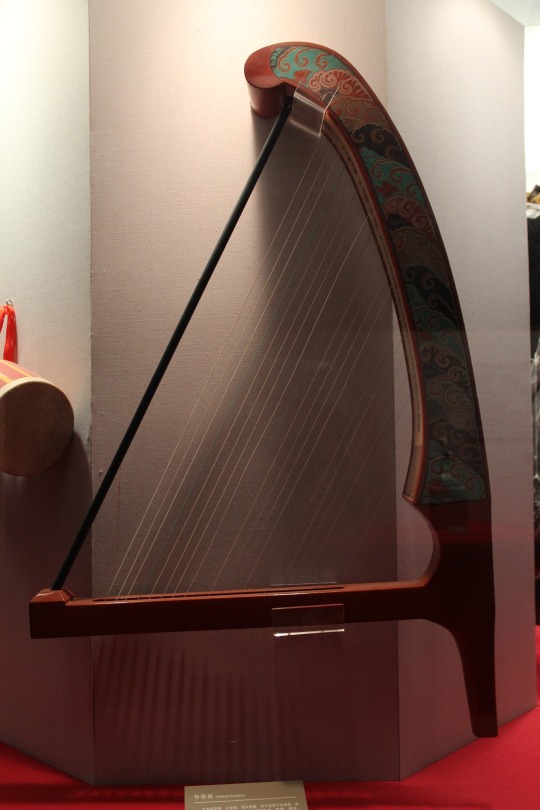
Vertical konghou 箜篌 in exhibit at the Gansu Provincial Museum, Lanzhou, China. Taken on May 10, 2013 by Gary Todd [image source].
Allow me to clarify something. The folk song 《公无渡河》 was recorded by Cui Bao in "Notes on Ancient and Modern Times" to be of Gojoseon origin. As such, Koreans consider it to be their oldest surviving folk song.
The Chinese consider it a Chinese Han Dynasty song on account of the tale being set and song created in the Lelang Commandery [108 B.C.E. - 313 C.E.] which is one of the four regions Gojoseon was split into while under Han rule. Koreans consider the residents of Lelang, and the other commandaries, to be Gojosen Koreans who retained a separate culture to the Han Chinese. If you wish to conduct further research into the song, don’t get surprised if you read different names for the characters that appear in the story.
Koreans call the song "Gongmudohaga (공무도하가)” and the ferryman Gwaklijago (곽리자고). The Korean folk tale differs from the Chinese retelling in that the Korean name of Gwaklijago wife, who is credited with creating the actual song, according to certain Chinese and Korean retellings, is Yeo-ok (여옥) rather than Li Yu (丽玉). In Cao Yong and Cui Bao’s retellings, the wife of the drowned drunk man created the song while, in the Korean version, it was the wife of the ferryman who, upon learning about what had transpired from her husband once he came home, created the song on her harp, called in Korean gonghu (공후).
Many Chinese poets have retold the story in their own ways and added, omitted, or reinterpreted content. Some of said poets are Li Bai and Chen Shou of Shu Han. On top is Li Bai's version which lacks strict syllabic structure, a signature of his style and, on the bottom, Chen Shou's more structured one:

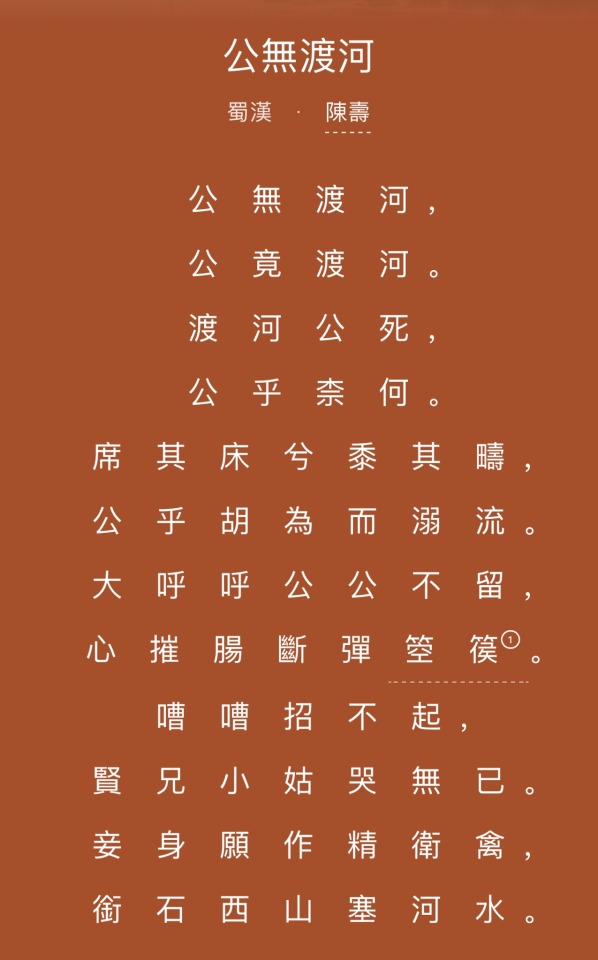

This expression 《公无渡河, 公竟渡河》 is often used as an allegory to satirize someone who is heading into clear danger but is too stubborn or obsessed to listen. If this person doesn't listen, then they are sure to run into trouble.
Catalogue (find the rest of the posts):
#chinese culture#chinese history#the advisors alliance#sima yi#history#three kingdoms#eastern han dynasty#korean folklore#li bai#chinese poetry#ancient chinese poetry#ancient china#gojoseon#korea
86 notes
·
View notes
Text
I watched this documentary series on the making of Creation of the Gods. These are just my reactions to it and not a synopsis.
Episode 1
It's cool seeing just how many people were involved in the making of this movie(s)
The writer Ran Jia'nan was saying that they had to cut out stuff from the story that might not have made sense (to a wider audience) or perhaps was not so relevant to the main plot, and the example she used was that when Ji Chang threw up the bits of Bo Yikao that he had eaten, those pieces became rabbits. After a long time of mulling it over they decided to cut that from the story.
The actors had to learn to ride horses, combat, archery.
Training montage!!!!!
Most of those chosen had not performed professionally so they needed to train in acting and performing too.
Their first lesson was in drums. Not sure how to put it into words, but basically the teacher said that drums are an instrument that can match our pulse, and that in battle, the rhythm at which we fight is the rhythm of our pulse. That's kind of hype, they look cool.
Second lesson was combat but they also had to work out a lot too.
Third lesson was horseback riding.
Rad that one of their trainers is like, a cowboy lol.
Not only did they train in horse riding, but horse riding while fighting.
Fourth lesson was culture/history class, including a classical Chinese education. Probably to give them a deeper appreciation and understanding of the characters and story.
Wuershan was more focused on whether the actors could relate to their characters.
Ji Fa's clothes look so good.
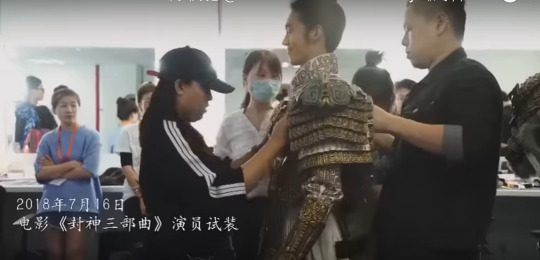

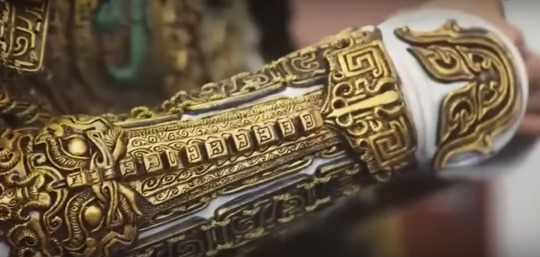
The scenes when Ji Fa was riding back home in the end of the first movie were filmed in Xinjiang. Those scenes were sooo good.
I appreciate that Wuershan wanted a very foxlike Daji and had Naran study fox behaviour. She watched fox videos but also went to the zoo to watch foxes :3
Speaking of Naran, I think she trained to be fluent in Mandarin for this movie which is so amazing :3
Daji's appearance right after she is possessed by the demon is so...wow. The long hair, the flowing robes. She didn't die in those clothes, but as the fox it's like, a little primitive. She's wearing very basic robes. She is not the original Daji, that's for sure.
The guys pumping in preparation for the dance scene :P
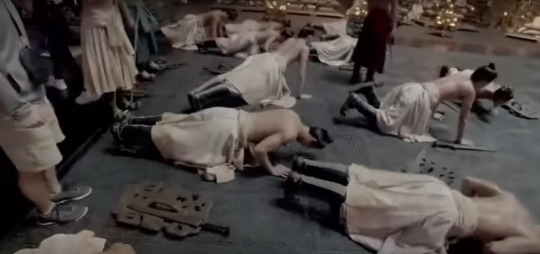
The dance performance was shot in one go! :3
They're literally rewatching and admiring their muscles here lol

Episode 2
The concept art is so cool. Wuershan emphasized the good vs evil battle so the one with the very clear yin-yang outline probably emphasized that the best.
The process by which they decided on the aesthetic for this movie series was interesting. Investiture of the Gods is based on a very ancient time, but the novel itself was written in the Ming Dynasty. Add to that the mythical elements that should in theory transcend time. What do you get? In the end, they went for a 70% 水陸畫 style (which is an artistic style and not a time period) and 30% 殷商 (which refers to the Yin and Shang dynasties), plus a bit of Song Dynasty 山水 art style (which I guess is referring to that style of landscape/nature art).
Wuershan really liked a mural that was in Yongle Gong and wanted the aesthetics of the movie to emulate that style.
Concept art for the outfits. According to Wuershan, in the Shang Dynasty, white was considered a regal colour.
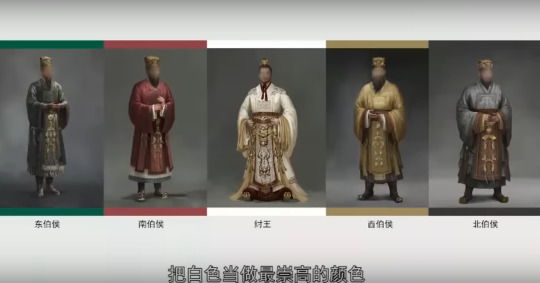
Empress Jiang and her family were from the east, by the ocean, so that was why they wore blue.

The duke from the south was thought to have come from a hot place, so that was why he wore red robes.
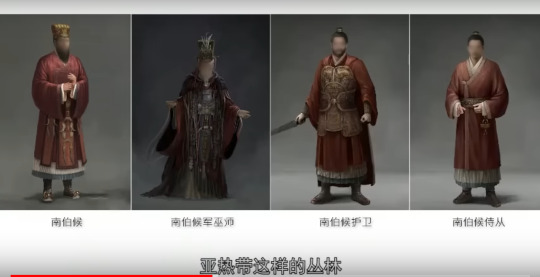
The northerners wore gray, as their lands were thought to be kind of...vast and gray.
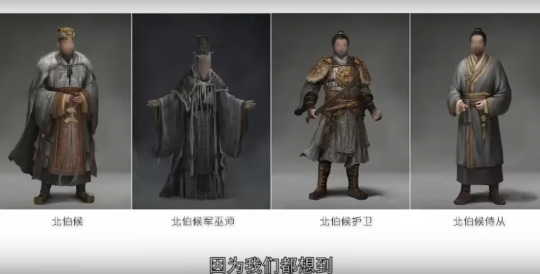
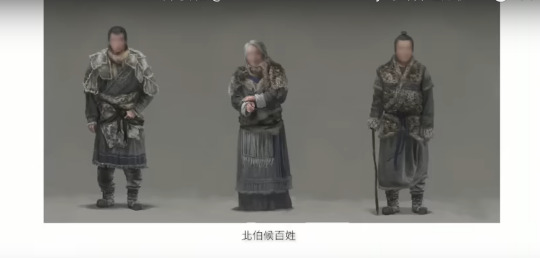
Then lastly the folks from the west, including Ji Chang, wore yellow, though here of course it looks more like a muted yellow, a brown. Anything too bright and it would remind people too much of an emperor.
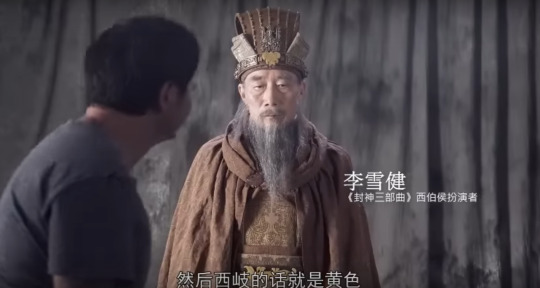
So the team put effort into fleshing out the world, even though we only saw a bit of it (at least in the first movie). But it kind of shows how ambitious Wuershan is about making this an "epic" movie series, not in the sense that it's super great, but in the sense that this is a big world with a lot going on. Even though this movie wasn't even that long, I did feel that sense of magnitude, that there were a lot of things going on even if we were just focused on the top.
Bo Yikao <3

Hell yeah Yang Jian in front of the blue screen
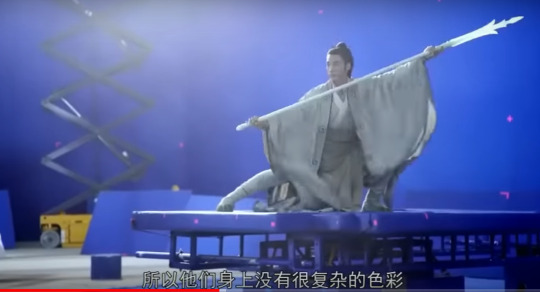
It's interesting that Wuershan is so involved in every aspect of the movie. He was discussing clothing materials with Tim Yip. He is the director, but I think he's just really passionate about the world he's building and he wants it to be as immersive as possible.
Naran's interpretations of her outfits was interesting. When she was still the real Su Daji, she was dressed in furs, and it gave a feeling of being protected and loved by her family. When she was possess by the fox demon, she wore a very thin purple outfit. She wore it while in the dead of winter, and it would give people a feeling that something was off. Then she wore a bright red outfit when she was dancing and it represented ambition. In the last scene of the first movie when Daji revived Yin Shou, Daji wore another very thin dress, this time in pink. Naran felt that at that time, Daji sincerely cared for Yin Shou (whether it was "love" or not is another question), so she would have been sad at seeing him dead. And so Naran associated pink with sadness.
Kris Phillips was raving about Tim Yip's outfits for Yin Shou in this part :P
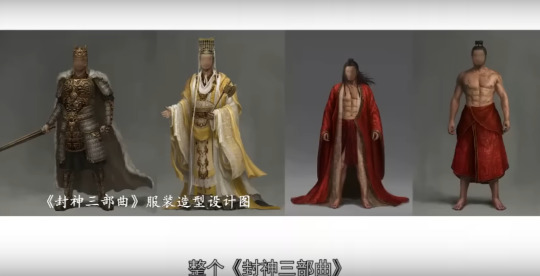
Oh this is cool I think they are sculpting Lei Zhenzi here.

And other monsters.

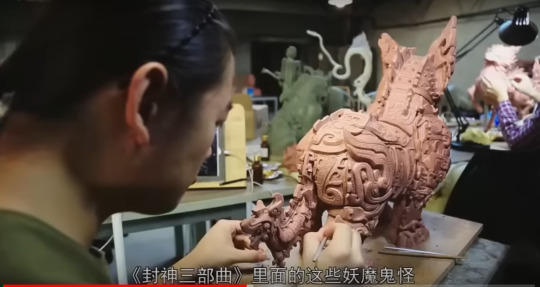
The concept artist Siji said that he appreciated that the concept artists were given enough time to develop and create the concept art.
I didn't even realize the fox demon had different forms. Siji was explaining that initially, the fox demon was more ghost-like, and only began to develop a form after eating enough people.
Hell yeah more monsters
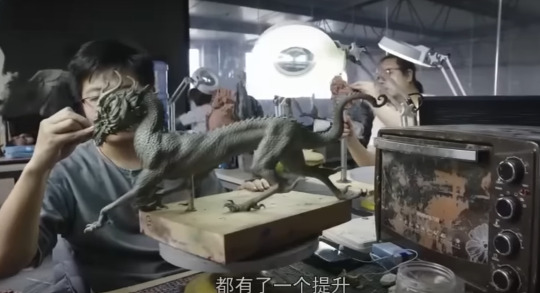
So we move on to the set and Wuershan puts just as much detail into building the set, which is very understandable. If your set is lame then it doesn't matter how beautiful your costumes are tbh. They went so far as to discuss the patterns of the beams, and what kinds of visual motifs would be on them.
Tim Yip was explaining how some of the structures they came up with would never have existed in history. But they did it for the aesthetics lol.
For some of the fight scenes, they did the storyboard by animating it in 3d because it would be easier to work with. In the example shown, the camera was constantly rotating around the character so I imagine that it would have been difficult to explain the constant motion of the camera with a normal drawn storyboard.
We got to the animation of Lei Zhenzi. The animator did a 360 view of what he would look like, and then another view where he would be carrying Ji Chang on his back, which he pointed out probably would not work if the wings were also on his back.
It looks like the entire movie was created in that Previz 3d animation system. Which makes sense. There's a lot that goes into filming and you might as well get a feel for the scenes, so that you can see if they actually deliver the intended impact.
Wu Yibei who I think is a special effects producer was talking about Lei Zhenzi. Basically it was really important for them to get all of the details of Lei Zhenzi right because he was going to be an important character in the second and third movies, and would interact with actors, would have feelings, etc.
This is super cool, this seems to be concept art for how Lei Zhenzi would have grown, how his wings would have developed as he grew up from a baby to an adult.
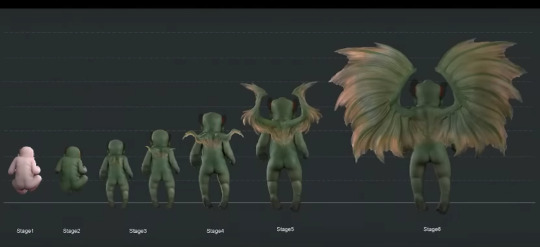
I saw this from another video that interviewed a special effects advisor for the movie. Douglas Smith had mentioned that Wuershan didn't really want Lei Zhenzi to be like a bird or a bat, and in the end, they settled for more of a fish feeling to Lei Zhenzi. Wuershan says this too in this documentary series.
Other than the physics of Lei Zhenzi's flight, I thought it was neat that Wuershan and the animators were discussing how his lightning powers would look like.
Wuershan had called up Han Pengyi and asked him if he'd wanted to be China's Andy Serkis lol. Han Pengyi served as the motion capture actor for Lei Zhenzi.
Oh wow Wuershan and Han Pengyi actually met Serkis and got to ask him about motion capture acting :o
So apparently when they animated Lei Zhenzi they hadn't really animated him blinking so Douglas Smith and team were figuring out how they could make use of other skin around Lei Zhenzi's eyes to express certain emotions.
Episode 3
Wow the craftspeople are carving the parts of the set by hand.
Look at this!!! Even just the concept art is amazing.
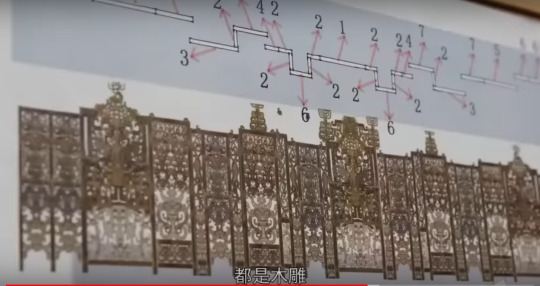
Wuershan did a lot of studying on the Lord of the Rings and consulted people who worked on that which is cool.
There was a discussion where Wuershan was discussing how the Lord of the Rings used more practical effects (in this case having a bunch of extras actually fighting in a battle) whereas by the time the Hobbit came around, they didn't consider this option anymore.
They spent a lot of time explaining how they came to film Shen Gong Bao's scene in which his head came apart from his body.
This was super blurry so I'm not going to screencap it but Ji Chang's actor Li Xuejian said "兒子演得不錯" and Wuershan patted Yu Shi's head in a 'did you hear that?' kind of way Yu Shi was all like humble like "noooo i'm not" hehe.
Apparently it was Father's day so Yu Shi wished Wuershan and Wang Yu a Happy Father's day lol.
They were trying to shoot a shot of five of the warriors on horseback jumping over a hurdle, while the horses were blindfolded. I'm not sure why the horses were blindfolded tbh but it was difficult because of that and the fact that they wanted the horses to jump together. Looked awesome though. And they got fistbump from one of the trainers for getting it done in two takes.
Taking care of the horses after a hard day's work.
Yu Shi explained that when they first started learning to ride horses, they were paired with any horse. After they got the hang of it, they were paired with a specific horse so that they could build a good relationship, and the actors would have to care for that horse too.
Ji Fa's character especially had a special relationship with his horse because he was a gift from his family and a symbol of home. And we saw them filming the scene near the end of the first movie where his horse was trying to get him to wake up so that they could go home.
Archery was something that challenged Yu Shi a lot so he practised it a lot and watched videos of archers.
Check out this diagram lol. I think they were trying to explain the setting to Gordy Haab who worked on the music.
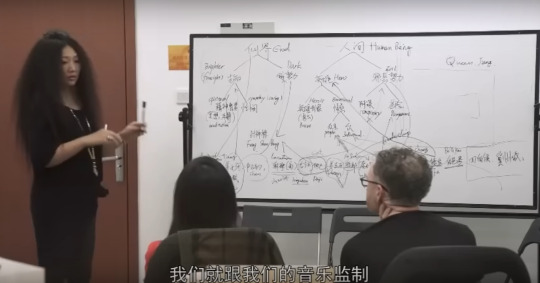
We saw Gordy checking out Chinese artifacts and listening to Chinese music. Yu Fei who was a music producer said that he had a good deal of interest in the culture.
It looks like they're having some musicians play outside at one of the sites? I'm not sure if they were actually playing though.
The male bass singers were very cool. Are they throat singing?
Looks like they're playing scenes from the movie on the screen
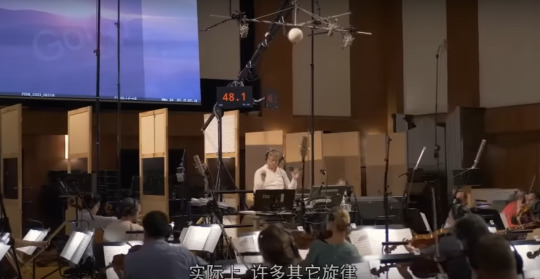
Me, an ex-oboist, doing the Dicaprio pointing meme to these oboists
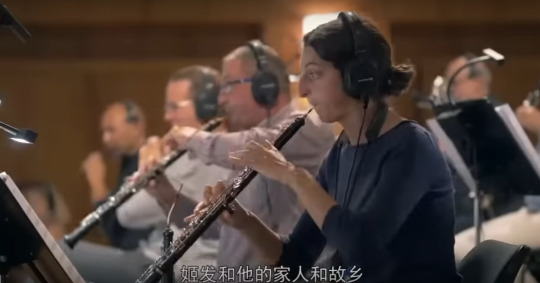
Wuershan is a fan of Penderecki. I don't know this composer so I had to look him up.
Wuershan delivering flowers to the various cast members :3
What a fun series!!!! I have some other behind the scenes videos to watch relating to this movie so I am excited :3
7 notes
·
View notes